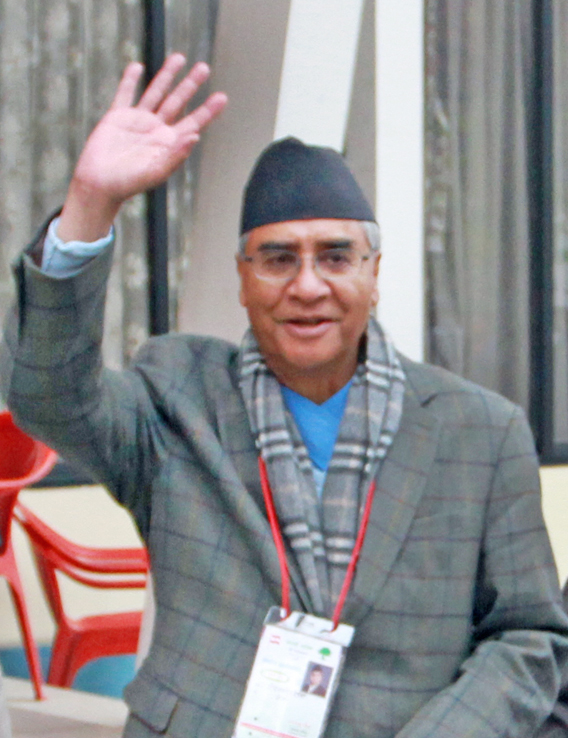Roaring win for Sher Bahadur Deuba
Kathmandu, March 7
Sher Bahadur Deuba was elected president of the Nepali Congress after he defeated Ramchandra Paudel in the runoff election held today as part of the party’s 13th National General Convention.
It was colossal victory for Deuba, as he defeated Paudel with a margin of 526 votes. Deuba garnered 1,822 votes and while Paudel got 1,296 votes. Deuba got 258 and Paudel 136 more votes than in the first round of elections.
Of the 3,161 voters, 3,140 cast their votes in the runoff polls. In the first round of polling held yesterday, 3,148 votes were cast. Voting began at 3:15pm and concluded at 6:30pm but counting began only at 10:15pm.
Deuba, 70, will be the party president for the next four years. Deuba, who has been prime minister thrice, was defeated by Girija Prasad Koirala and Sushil Koirala for the top party post in 11th and 12th NGCs. Deuba, who had split from the NC in 2002 to form Nepali Congress-Democratic, had led the NC-D from 2002 until the two Congresses reunited in 2007.
“I have already won the elections and the runoff polls are being held just for formality. I will encompass all friends, including Ramchandra Paudel and Krishna Prasad Sitaula,” Deuba said after he cast his vote for the runoff polls.
Counting of votes for the posts of general secretary and treasurer and 61 Central Working Committee members from open and reserved categories will be held tomorrow afternoon at the party headquarters in Sanepa, according to election committee secretary Pradip Parajuli.
After none of the three candidates Paudel, Deuba or Krishna Prasad Sitaula garnered mandatory 50 per cent of the total votes cast, runoff polling was held today. In the first round, Deuba polled 1,564 votes, just 11 short of the required 1,575.
His closest rival Paudel got 1,160 votes, while the third contender, Sitaula, got 324 votes. Exactly 100 votes were declared invalid. Counting for the first round began after midnight and the result was announced around 5:00am.
The 12th NGC held in September 2010 had elected Sushil Koirala as the party president after he defeated Deuba by 335 votes.
The incumbent unnatural coalition government cannot run the country. There is a need for natural coalition of Congress, CPN-UML, Unified CPN-Maoist and Madhes-based parties. And Deuba will work to form such a coalition under his leadership
• Balkrishna Khand, NC leader
Sitaula, Thapa ‘remain neutral’
KATHMANDU: After the first round of polling failed to elect party president, third contender Krishna Prasad Sitaula and candidate for the post of general secretary from his panel, Gagan Thapa, did not openly express support for Paudel or Deuba, although Sitaula supported Deuba covertly.
Sitaula tried to play a role of mediator between Deuba and Paudel for party unity, but failed. He urged Paudel not to go for the runoff election and maintain unity among the three factions through consensus.
He had floated a proposal to declare Deuba party president and deciding the position of parliamentary party leader through consensus. However, both turned down Sitaula’s proposal, according to sources.
Paudel went to Sitaula’s residence on Monday morning, seeking his support in the runoff polls. In response, Sitaula appealed for consensus and urged him to skip the runoff polls.
He then issued a press statement calling for consensus. After the bid to forge consensus failed, Sitaula issued the second press statement urging voters to vote independently.
Meanwhile, Gagan Thapa, candidate for the post of general secretary from Sitaula’s panel, said he did not want to take a position in the runoff poll.
41 district presidents stand by Paudel
KATHMANDU: As many as 41 of 75 district presidents of the party issued a joint appeal before the runoff elections began and urged NGC representatives to vote for Ramchandra Paudel.
They argued that Paudel’s victory was a must for institutional development of the party and a feeling of unity.
Counting delayed
KATHMANDU : Although the counting of votes was supposed to begin at 8:00pm, it began only at 10:15pm after four/five extra votes were found in the ballot boxes. After the votes were identified as sample votes, they were excluded from the votes before the counting began.






